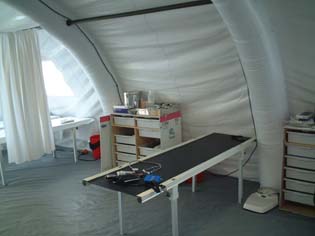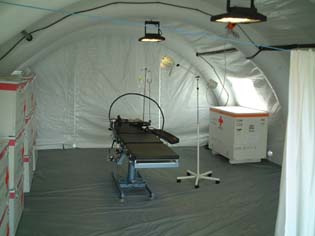Mobile
Clinic from Normeca A/S
to Jordan
By
Colonel. Oyvind Myrvold (R)
Commanding officer of Norwegian Medical Corps.
Early
in February 2003, Normeca A/S received, through our collaborator
in Japan, and inquiry on the delivery of equipment for two complete
mobile clinics to the refugee camps in Jordan, near the Iraq border.
On February 5th, 2003, we received the formal order. The purchaser
and user of the clinics was the Japanese humanitarian organisation
Japan Platform / Iraq Crisis Respond Team (JP/ICRT).
PREPOSITIONS FOR THE MISSION. |
||
- |
The clinics were to be established as medical clinics in special
camps for refugees expected from Iraq. One, in the main camp near
the city Ruweidshed, and the other at the Iraq border, to be able
to treat patients with an immediate need for treatment. UNCHR was
in charge of the co-ordinating management for the establishing and
managing of the camps. The camps were to be built / prepared for
up to approx. 90 000 refugees. |
|
-
|
Normeca
A/S should also provide 7 vehicles to the team. |
|
- |
A planning team from JP/ICRT was established in Amman Jordan already
in good time before the equipment was transferred. |
|
- |
A representative from Normeca A/S was responsible for the establishing
of the two clinics. |
|
| ACCOMPLISHING | ||
| -
|
Normeca
A/S’s representative and the main parts of the material from
Norway arrived at Amman by airfreight on February 18th, 2003. Due
to the Jordan authority’s restrictions on transports and establishing
in the Iraq borderlines, the establishing was considerably delayed.
We could not start the transportation before March 17th, 2003. |
|
| - |
The waiting time in Amman was used to planning and purchasing vehicles.
The budget did not allow any purchase of new vehicles, but we succeeded
to find 7 newer and very good second hand vehicles at a very good
price. One of the vehicles was already an ambulance, and 2 were
later equipped as ambulances. The last 4 vehicles were for transportation
of personnel and materials. |
|
| - |
On
March 19th, 2003, the clinic in the refugee camp at Ruwayshed was
established and ready to use, the other, at the border, were further
delayed after directions from the UNCHR. The JP/ICRT however, performed
medical effort with mobile teams at the border, and in “no
mans land”. The establishing was made very difficult, but
not delayed, due to very strong and long-lasting sandstorms. Large
parts of the refugee camps, were however destroyed by the storm,
especially the tents. |
|
| - |
The representative from Normeca A/S returned home after having accomplished
the mission on April 12th, 2003. |
|
| EXPERIENCES
/ “LESSONS LEARNED” |
||
| - |
The materials. | |
Under
difficult conditions like this, as sandstorms, there are large
demands to the quality of the materials. In spite of severe damages
in the camps, the materials delivered by Normeca A/S functioned
very well. However, because of the dust and the sand, we had to
intensify the maintenance of the technical equipment, including
especially generators, heaters and air-conditioning. All the equipment delivered from Norway functioned very well, it is adjusted for field conditions, is robust, easy to establish, operate and maintain. |
||
|
|
||

Others.
The
co-operation between the JP/ICRT, the local employees and the representative
from Normeca A/S was satisfactory and functioned very well. The differences
in the culture and language, was not a problem.
Mailandvn. 12, P.O. Box 404, 1470 Loerenskog, Norway
Phone: +47 67 92 76 00, Fax: +47 67 92 76 91
E-mail: post@normeca.no